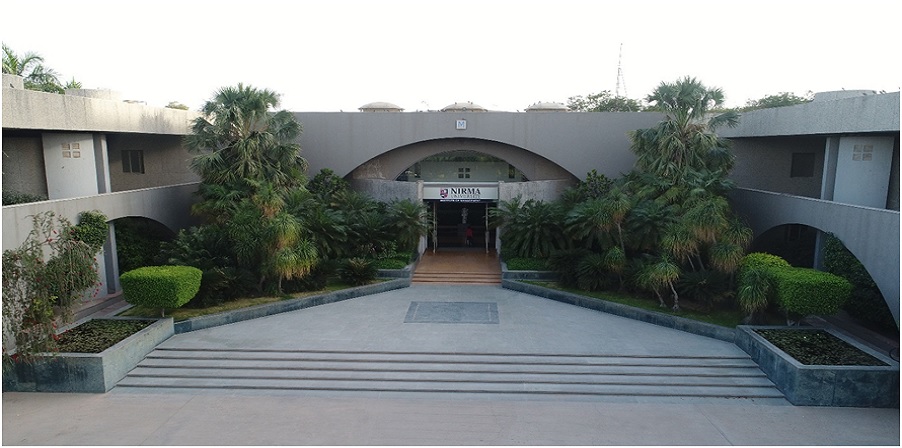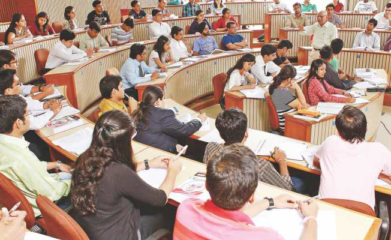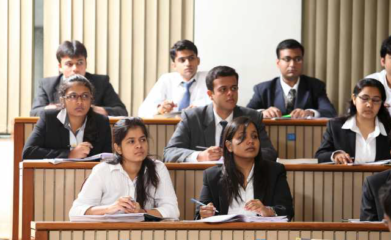
The curriculum is continuously updated to integrate changes that are taking place in the business environment. It is benchmarked against the courses offered by the best B-schools. Suggestions are also invited from industry experts and alumni in designing the curriculum. The curriculum consists of compulsory (core) and elective courses. The core course package provides the students with the foundation of business. Elective courses, on the other hand, are offered with an option to specialise in an Area. The Institute presently offers specialisation in Finance, Marketing, Human Resource Management, Operations Management, Digital Transformation and Analytics and International Business.

The main pedagogical methods are lectures, case studies, simulations and project work. These methods are further augmented by role-plays, group discussions, movies, field visits and certifications. The actual mix varies with the nature of a course. To ensure effective learning, the Institute leverages the latest technologies to make the teaching-learning process more experiential, participative and practice oriented.
The pedagogy is designed in such a way that academic rigour is maintained and students are continuously evaluated. Strong support from the industry and robust emphasis on ethics and values are the notable features of the pedagogy. Case studies help students experience management predicaments whereas role-plays and simulations prepare them to take decisions in real time scenarios.
Additionally, interaction with industry experts, live projects, innovation workshops, participation in conclaves and learning through co-curricular activities give a feel of the real world which encourages active learning for a stronger academic foundation.
The pedagogy ensures that analytical skills are developed through concepts and practice, which help the students hone their decision-making skills. There is a very strong focus on building competencies related to the management of technology and data enabled business, innovation and entrepreneurship.

Institute of Management has adopted the philosophy of Outcome Based Education (OBE) for all programmes, that aligns Programme Educational Outcome (PEOs) and Programme Learning Outcomes (PLOs) with the Vision and Mission of the University. OBE, as a teaching a learning philosophy, focuses on development of professional knowledge, skills, inculcating employability skills, character development and promoting social responsibility also.
OBE is more student centric, as compared to traditional forms of education. In OBE, each student is motivated to take ownership of his or her learning and to reflect on the learning process. A structured method of developing curriculum, selecting instructional methods, designing assessment schemes appropriate to the course forms the foundation of OBE. Rubrics and assessment schemes, which articulate the expectations of the course are shared in advance with the students, assisting them to track their progress in each course. Further, to ensure effective learning, the Institute uses a mix of pedagogy such as case studies, simulation, discussions, presentations, role plays, project work, etc. in addition to the traditional lecture method to make the teaching-learning process more experiential and participative.
Additionally, Assurance of Learning (AOL) standards are also set, that measure how well the course has accomplished its educational aims. Through established mechanisms, the level to which students have learnt is assessed. This is then used for improving the teaching-learning process. The Assurance of Learning is thus a key driver of educational betterment and continuous improvement in the Institute.
Outcome Based Education promotes a shift from lower-order thinking and learning (remembering, understanding and application) to higher-order thinking and learning such as analyzing, evaluating and creating. Students are guided on this movement to higher-order thinking through challenging standards of performance that deeply engage them. A constant pursuit to provide extensive opportunities for the learners to upgrade themselves to the highest levels of performance drives the concept of OBE.

The Institute organises several certification programmes in association with professional agencies. In the past, the following certification programmes were offered:

Industry exposure of the students is also facilitated through a series of guest lectures from industry experts around the year. The Institute organizes Institute Lecture Series wherein eminent persons are invited to speak on topics of contemporary interest. The Institute also organizes the Institute’s CEO Lecture series. Eminent CEO including Mr Amit Malik. (CEO & MD, Aviva Life Insurance India Ltd), Mr Srikanth Velamakanni (Co-founder, Group Chief Executive & Executive Vice Chairman, Fractal Analytics), Mr Bhupendra Suri (CEO, Creamline Dairy Products Ltd. (Godrej Group), Mr Subir Palit (Country Head, Greenply Industries Ltd.), Mr Manoj Kohli (Country Head, Soft Bank India), Mr Akshat Saxena (Co-Founder, ePayLater), Mr Suresh Narayanan (Chairman & Managing Director, Nestle India Ltd.) have delivered lectures last year during the Institutes Silver Jubilee Celebrations.
The Institute regularly organizes at least two lectures in a month under its Seminar Series. These lectures are held on various management themes and are delivered by Academia, Industry Experts, Senior Alumni and prominent Government officials. Some of the notable speakers include Mr Siddharth Anand Kumar (Vice President, Films & Events, Saregama India Ltd.), Ms Deepali Naair (Director, Marketing, IBM, India & South Asia), Mr Vedamurthy Mallikarjuna Swamy (Project Management Leader, Ingersoll Rand (India) Ltd.), Ms Smriti Handa (Global Talent Acquisition Director, Reckitt), Ms Shinjini Kumar (Co-Founder, SALT mysaltapp), Mr Gautam Baid (Founder, Stellar Wealth Partners), Mr Shailesh Pathak (Head, Development Projects -Larsen & Toubro & Co-Head, FICCI National Committee on Infrastructure).

The Institute strongly believes in voluntarism. Each student of the Institute is provided opportunities to choose their goals and pursue their achievement through the aegis of student clubs and committees. Clubs and Committees fully imbricate the lives of our students. They provide a platform to experience and learn management on the most practical, immediate and direct basis. More importantly, they are symbols of human expression, empowerment and liberation. These clubs meet weekly and organise workshops, training programmes, interactive games, competitions, guest lectures etc. throughout the year to serve the almost insatiable appetite of managers driven by the urge to explore, create and learn. The co-curricular life of a student is a vibrant kaleidoscope encapsulating their individual and collective talent, energy, hope and expression.